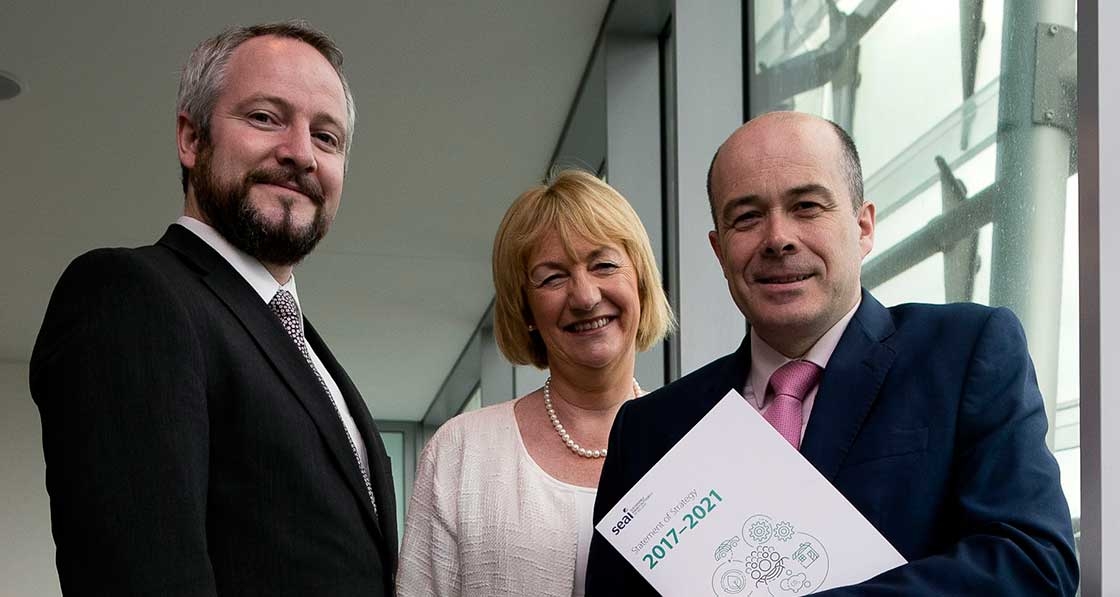
- Events
- Posted
SEAI shifts focus to deep retrofitfit with conference & pilot scheme
The Sustainable Energy Authority of Ireland has announced a new €5million deep retrofit pilot programme for 2017 projects to upgrade inefficient buildings to an A3 rating or better – with a particular emphasis on ventilation, airtightness, thermal bridging, interstitial condensation and preventing overheating. Grants are available to cover between 50 and 95% of the costs of deep retrofit works for di�fferent categories of participants.
This article was originally published in issue 22 of Passive House Plus magazine. Want immediate access to all back issues and exclusive extra content? Click here to subscribe for as little as €10, or click here to receive the next issue free of charge
Pictured above at the launch of SEAI’s new five-year strategy are (l-r) SEAI CEO Jim Gannon; SEAI chair Julie O’Neill; and climate action and environment minister Denis Naughten.
The Irish construction sector must deliver over €35 billion worth of deep retrofits to buildings between now and 2050 if Ireland is to meet its targets on climate change.
According to SEAI, as many as one million homes built in the last century are considered to be significantly energy inefficient, resulting in higher energy bills and, in some cases, poorer health and wellbeing for homeowners.
SEAI held its inaugural National Deep Retrofit Conference on 21 June – the first of its kind to take place in Ireland with participation from key stakeholders including building design and construction professionals, financiers, local authorities and policy makers.
Opening the conference, which was held in Dublin’s Aviva stadium, climate action and environment minister Denis Naughten TD said: “The performance of our building stock is one of the greatest energy efficiency challenges facing our country. However, in overcoming these challenges there is the potential for significant economic and employment opportunity, as well as delivering more comfortable, healthier homes that are cheaper to run.”
Announcing the pilot deep retrofit scheme, SEAI CEO Jim Gannon said that deep retrofitting offers a better value alternative to piecemeal changes and additions to a house: “Through our Deep Retrofit Pilot we are exploring ways to help homeowners overcome the different barriers to deep retrofit. We’re also looking at opportunities to build a robust and sustainable supply chain to support this activity. This involves educating homeowners and communities, developing consumer friendly technologies, making clean energy finance available and delivering value by helping homeowners to lower their energy bills and to enjoy warmer and healthier homes.”
The conference featured national experts, as well as international speakers who presented global context and learnings. Speakers discussed case studies from home and abroad; the potential within the construction sector; and challenges and opportunities facing the Government and the role of state agencies, research and education bodies and private industry in delivering energy efficient homes and sustainable communities. Victoria Burrows, project manager with the World Green Building Council shared insights from WorldGBC’s ‘Advancing Net Zero’ project, which calls for all buildings to become net zero carbon emissions by 2050:
“Buildings are responsible for around 30% of global emissions – roughly equivalent to the annual emissions of China. A monumental and coordinated effort is required by businesses, governments and non-governmental organisations to transform existing buildings into healthy, cost-effective and energy efficient spaces where people can live, work and learn.”
SEAI strategy pledges sustainable energy, climate action & jobs
Meanwhile SEAI launched its new five-year strategy in July. Over the course of the coming five years, SEAI will seek to ensure citizens play an active role in the transition to a low carbon economy and a healthier future.
“SEAI has shown that it can deliver,” said SEAI chair Julie O’Neill. “Since our last strategy was published, we have invested over €400 million in sustainable energy projects throughout the country. This has saved the Irish economy over €1 billon in that time. Now it is time to be even more ambitious because the challenge set out in the government’s White Paper remains stark. It will require citizens, business, policy makers and regulators to work together in pursuit of this shared goal.”
SEAI will focus on empowering citizens by giving them the means to use less energy and use clean energy at an individual level, raising awareness of sustainable energy, and increasing the impact from grant schemes. SEAI will also target deep retrofit, greater uptake of electric vehicles, further development in the public sector, provision of expert and authoritative analysis and enhancing the value derived from energy research and innovation.
“We are at the forefront of delivering material and measurable impact when it comes to energy savings and the transition to a low carbon future,” said SEAI CEO Jim Gannon. “We strive to be an open, accessible organisation taking direct actions that enable the country to achieve its climate change targets and provide a healthy, secure and clean energy future. We want to lead the transformation of the Irish economy to a lower carbon future – nothing less will do given the level of the challenge the country faces.”






